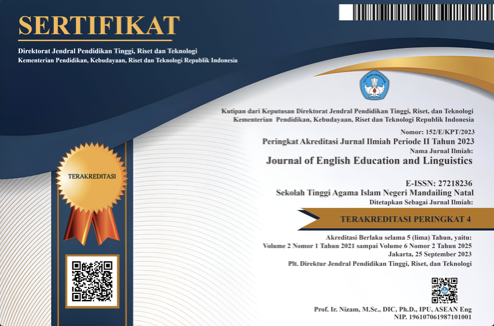TEACHING ENGLISH THROUGH ZOOM VIDEO CONFERENCING: SOME EFL TEACHERS’ EXPERIENCES
DOI:
https://doi.org/10.56874/jeel.v2i1.403Keywords:
EFL Teachers, Teaching Experiences, Zoom Video ConferencingAbstract
This article attempts to explore the EFL teachers’ experiences in using zoom video conferencing platform as the technological massive changes during remote learning in the pandemic situation. The research question is how EFL teachers’ experience in the perception toward zoom video conferencing platform. The aims are to know EFL teachers’ experience toward zoom video conferencing platform in the perception of its usefulness, ease of use and satisfaction during the zoom video session. The design of this study is a mixed method analysis. The data instrument was collected using close ended questionnaire and interview. The data was gathered from 27 respondents. The findings are most of teachers have positive experience on its usefulness, attractiveness and user friendly. Only few teachers have negative experiences due to the limited internet quota and unstable connection.
References
Archibald. (2019). Using Zoom Video Conferencing for Qualitative Data Collection: Perceptions and Experiences of Researchers and Participants. International Journal of Qualitative Methods, 22-31.
Asnawi, N. (2018). Pengukuran Usability Aplikasi Google Classroom sebagai E-LEarning Menggunakan USE Questionnaire. Journal of Computer, Information System, & Technology Management, I(2), 17-21.
Beuning, P. J., Besson, D. Z., & Synder, S. A. (2014). Teach Better, Save Time, and Have More Fun: A Guide to Teaching and Mentoring in Science. Arizona: Research Coorporation for Science Advancement.
Blum, S. D. (2020, April 22). A Professor Explores Why Zoom Classes Deplete her Energy (opinion). Retrieved May 19, 2021, from Inside Higher Ed.: https://www.insidehighered.com/print/advice/2020/04/22/professor-explores-why-zoom-classes-deplete-her-energy-opinion.
Cakrawati, L. M. (2017). Students’ Perception on the Use of Online Learning Platforms in EFL Classrooms. English Language Teaching and Technology Journal (ELT-Tech Journal), I(1), 22-30.
Creswell, J. W. (2009). Research design: Qualitative, quantitative, and mixed methods approaches. Thousand Oaks, California: SAGE Publications, Inc.
Gray, L. M., Wylie, G. W., Rempel, G. R., & Cook, K. (2020). Expanding Qualitative Research Interviewing Strategies: Zoom Video Communications. The Qualitative Report, XXV(5), 1292-1301.
Haryanto, A. S., & Sumarni, S. (2019). Teachers’ Experiences on the Use of Google Classroom. 3rd English Language and Literature International Conference (ELLiC) Proceedings, III(1), 9-18.
Lowenthal, P. R., Borup, J., West, R. E., & Archambault, L. (2020). Thinking Beyond Zoom: Using Asynchronous Video to Maintain Connection and Engagement During the COVID-19 Pandemic. Journal of Technology and Teacher Education, XXVIII(2), 383-391.
Malik, R. S., & Hamied, F. A. (2016). Research Methods: A Guide for First Time Researchers. Bandung: UPI Press.
Mulyadi, D. (2018). EFLStudent Teachers’ Perception and Challenges toward Online Platforms in Language Pedagogy. 2 nd English Language and Literature International Conference (ELLiC) Proceedings, II.
Muslem, A., Yusuf, Y., & Juliana, R. (2018). Perceptions and Barriers To Ict Use Among English Teachers in Indonesia. Teaching English with Technology, XVIII(1), 3-23.
Ng, C. H. (2020). Communicative Language Teaching (CLT) through Synchronous Online Teaching in English Language Preservice Teacher Education. International Journal of TESOL Studies, II(2), 62-73.
Pitura, J., & Berlinska-kopec, M. (2018). Learning English while exploring the national cultural heritage: Technology assisted project-based language learning in an upper-secondary school. Teaching English with Technology, XVIII(1), 37-52.
Yadav, A. (2016). Expanding Computer Science Education in Schools: Understanding Teacher Experiences and Challenges. Computer Science Education, XXVI(4), 235-254.
Downloads
Published
Issue
Section
License
All articles published in the Journal of English Education and Linguistics are licensed under a Creative Commons Attribution-ShareAlike 4.0 International (CC BY-SA) license. This means anyone is free to copy, transform, or redistribute articles for any lawful purpose in any medium, provided they give appropriate attribution to the original author(s) and Journal of English Education and Linguistics, link to the license, indicate if changes were made, and redistribute any derivative work under the same license.
Copyright on articles is retained by the respective author(s) without restrictions. A non-exclusive license is granted to the Journal of English Education and Linguistics to publish the article and identify itself as its original publisher, along with the commercial right to include the article in a hardcopy issue for sale to libraries and individuals.
Although the conditions of the Creative Commons Attribution-ShareAlike 4.0 International (CC BY-SA) license do not apply to authors (as the copyright holder of your article, you have no restrictions on your rights), by submitting to the Journal of English Education and Linguistics, authors recognize the rights of readers and must grant any third party the right to use their articles to the extent provided by the license.

This work is licensed under a Creative Commons Attribution-ShareAlike 4.0 International License.








